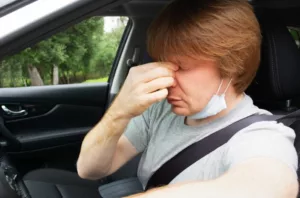Car sickness, a prevalent and frequently exasperating condition, can transform even the most exhilarating road trips into a distressing experience. The symptoms—nausea, dizziness, and general malaise—are not only disagreeable but can occasionally detract from the enjoyment of travel. Fortunately, remedies for car sickness are readily accessible, whether you seek immediate relief or long-term prevention strategies.

Motion sickness arises when the brain receives incongruent signals from the eyes, inner ear, and body. As your eyes perceive motion, your inner ear may remain stationary, resulting in cognitive dissonance and inducing nausea. Understanding these triggers and implementing appropriate remedies can significantly alleviate or completely eradicate symptoms, ensuring that your travels are comfortable and pleasurable.
Lifestyle Adjustments: Simple yet Effective Solutions
| Remedy Type | Details |
|---|---|
| Positioning | Sit in the front seat or choose a window seat to minimize motion. |
| Focus | Keep your gaze fixed on a distant object, like the horizon, rather than looking at close-up objects like books or phones. |
| Fresh Air | Open a window or direct air vents towards you to improve ventilation and reduce nausea. |
| Breaks | Take regular breaks during long trips to walk around, get fresh air, and stay hydrated. |
| Hydration | Drink plenty of water, as dehydration can worsen symptoms. Avoid caffeine and alcohol. |
Comprehending Automotive Motion Sickness: Mechanisms and Causes
Motion sickness occurs when there is a discrepancy between visual input and vestibular sensations. The discord between visual stimuli and vestibular signals perplexes the brain, eliciting the well-known sensations of nausea and discomfort. Observing an individual spin while remaining stationary induces a natural sensation of dizziness and discomfort. The identical principle is applicable when your body remains stationary while your eyes perceive motion in a vehicle.
To address this, implementing straightforward modifications, such as occupying the front seat and concentrating on a fixed point like the horizon, can aid in harmonizing your sensory input. This fosters a more harmonious experience for your brain, markedly alleviating the symptoms of motion sickness.
Natural Remedies: Utilizing the Efficacy of Nature
For numerous individuals, natural remedies such as ginger and peppermint serve as a crucial solution for motion sickness. Ginger has been utilized for centuries to alleviate gastrointestinal discomfort. Ginger’s natural compounds alleviate nausea and facilitate digestion, whether ingested as tea, biscuits, or fresh root. It is remarkably efficacious, providing relief in as few as 20 minutes.
Likewise, peppermint is an exceptionally adaptable remedy. Peppermint’s calming properties aid in soothing the stomach, whether consumed as mints, teas, or essential oils. Transporting peppermint candies or utilizing peppermint oil while traveling can enhance your comfort throughout the journey. Acupressure wristbands may provide immediate relief by exerting gentle pressure on specific wrist points, potentially alleviating nausea.
Pharmaceuticals: Prompt and Dependable Alleviation
When lifestyle modifications and natural therapies prove insufficient, pharmacological interventions can offer rapid alleviation. Over-the-counter antihistamines, such as dimenhydrinate (Dramamine), are commonly utilized for alleviating motion sickness. These medications function by inhibiting the signals that induce nausea; however, they may induce drowsiness, necessitating advance planning if driving is required.
Scopolamine patches provide an effective solution for prolonged relief. These transdermal patches administer medication progressively and can mitigate nausea for a duration of up to three days. Although these patches are highly efficacious, they should be utilized under the supervision of a healthcare professional, particularly for individuals with preexisting health conditions such as glaucoma.
Distraction Strategies: Diverting Your Attention from the Motion
Occasionally, the most effective method to alleviate car sickness is to divert your attention. Stimulating your intellect can divert attention from the discomfort. Engaging with music, vocalizing your preferred tracks, or participating in dialogue can redirect your focus, offering a necessary cognitive respite from nausea.
It is crucial to refrain from reading or utilizing electronic devices, as concentrating on near objects may exacerbate symptoms. When traveling with companions, partake in casual dialogue or narrative sharing. This not only maintains a jovial atmosphere but also allows everyone to temporarily disregard the motion.
When to Pursue Medical Assistance: Ongoing Symptoms
Individuals suffering from chronic motion sickness may require medical consultation. If symptoms continue despite implementing lifestyle modifications and remedies, it may be prudent to seek medical consultation. A healthcare professional can ascertain if your symptoms are associated with an underlying condition and recommend suitable treatments. In certain instances, prescription medications or therapies such as cognitive behavioral therapy may offer a lasting solution.
The Prospects of Motion Future Perspectives on Illness Remedies
As we progress into a future influenced by technological advancements, we can anticipate increasingly sophisticated solutions for vehicular nausea. The potential applications range from virtual reality therapies to innovative wearable technology designed to alleviate motion sickness symptoms. Although these innovations are currently under development, they possess the potential to provide enhanced methods for managing or preventing car sickness in frequent travelers.
Meanwhile, established remedies such as repositioning, utilizing natural therapies, and administering medications continue to be essential strategies in combating motion sickness.
Travel Comfortably with These Remedies for Motion Sickness
Motion sickness need not disrupt your travel arrangements. By implementing basic lifestyle modifications, utilizing natural remedies such as ginger or peppermint, and employing over-the-counter medications, one can mitigate nausea and discomfort. Distraction methods and adequate hydration are crucial for facilitating a more seamless experience. Individuals experiencing ongoing difficulties should seek the counsel of a healthcare professional, which can provide further remedies, guaranteeing preparedness for future endeavors.
